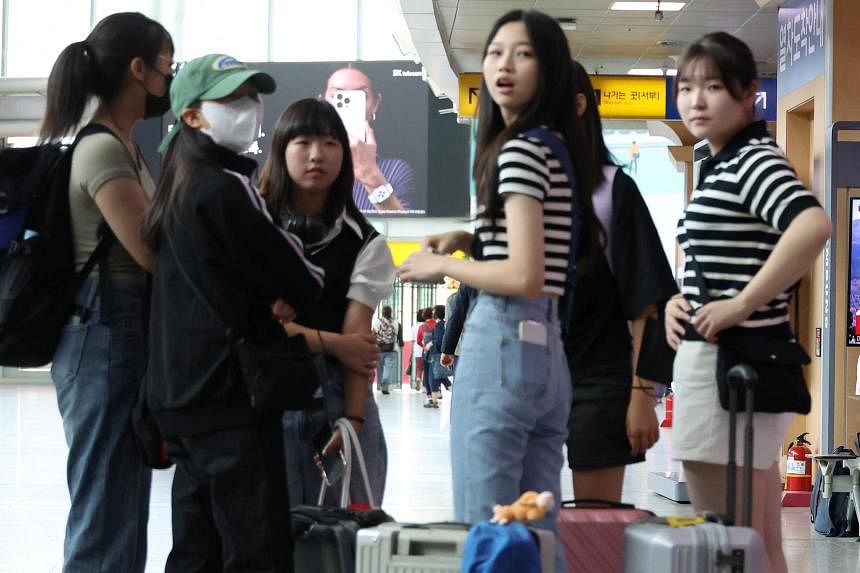
SEOUL - South Korea’s Ministry of Education on Wednesday unveiled a five-year plan aimed at attracting 300,000 international students to tackle the nation’s rapidly declining school-age population and to strengthen the competitiveness of local universities already reeling from enrollment shortages.
To attract more foreign students to enroll in Korean universities, the Education Ministry plans to revise the International Education Quality Assurance System, which stipulates that more than 30 per cent of foreign first-year students must be either level two or three holders of the Test of Proficiency in Korean (TOPIK).
Instead, the ministry will consider lifting the requirement barrier while strengthening education on the Korean language and culture. It will also make the current offline TOPIK exam available online. The Education Ministry will also team up with the Culture Ministry to cater to growing demand for Korean language learning.
Addressing the prolonged decline in birth rate, leading to labour shortages and a workforce affected by a brain drain, the ministry said it would bring in foreign students specialising in science, technology and engineering to bolster the country’s high-tech industries.
Through the fully funded Global Korea Scholarship programme, it will provide financial aid for 2,700 international students studying science and engineering in master’s and doctoral programmes by 2027. The scholarship will also support 6,000 non-science subject students.
To attract high-skilled talent, the ministry in particular hopes to expand state scholarships for students from countries with high demand for economic cooperation with South Korea. These include Poland - known for its aerospace and defence industries - and the United Arab Emirates, which has a large nuclear energy sector.
Currently, students from China, Vietnam and Uzbekistan make up 68 per cent of the international student quota in South Korea, with many of them concentrating their studies on humanities majors, according to the ministry.
Calling cutting-edge industries the “source of national competitiveness,” Education Minister Lee Ju-ho said his ministry is committed to supporting foreign talents to settle in local communities.
“We are in desperate need of nurturing (science) talent at a time when the war for technological supremacy is intensifying. Japan, for example, has set a target of attracting 400,000 foreign students by 2033. Now is the time to attract foreign talent strategically,” Mr Lee said during a press briefing held at the Government Complex Seoul.
Under the new scheme, the Education Ministry said it would team up with the Ministry of Justice to establish a fast-track visa system to woo foreign science and technology talent so that foreign-born applicants will no longer face red tape and excessive visa delays.
South Korea has seen higher numbers of foreign students in recent years, with 153,695 students entering Korea in 2020, 152,281 in 2021 and 166,892 in 2022, despite the coronavirus. Among them, nearly 30,000 foreign students graduate from Korean universities annually, the data showed.
But unlike global competitors such as Japan and the US, South Korea restricts international students’ pathways to residency and employment due to visa issues, and companies refrain from recruiting foreign applicants, ultimately driving them to other destinations or to return home.
Once the system takes effect, students with either a master’s or doctoral degree in science and technology can receive permanent resident status or Korean citizenship in three years instead of six.
As part of post-graduation work programmes, the Education Ministry will also help science and technology students gain work experience in their field at medium-sized companies after graduating.
Those with a D-2 visa, or student visa holders, will be able to work up to 40 hours per week. Previously, they were not allowed to work more than 25 hours per week. Foreign students can also do up to 30 hours of part-time work.
https://news.google.com/rss/articles/CBMibmh0dHBzOi8vd3d3LnN0cmFpdHN0aW1lcy5jb20vYXNpYS9lYXN0LWFzaWEvc291dGgta29yZWEtdW52ZWlscy01LXllYXItcGxhbi10by1hdHRyYWN0LTMwMDAwMC1mb3JlaWduLXN0dWRlbnRz0gEA?oc=5
2023-08-17 00:26:00Z
2350285637
Tidak ada komentar:
Posting Komentar